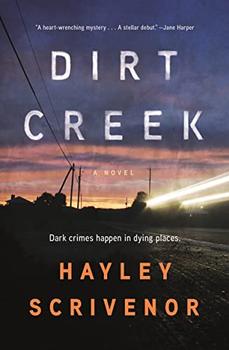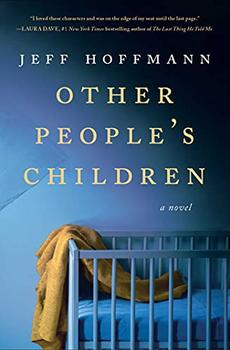Summary | Excerpt | Reading Guide | Reviews | Beyond the book | Read-Alikes | Genres & Themes | Author Bio

After fictionalized biographies of Zelda Fitzgerald (Z, 2013) and Alva Vanderbilt (A Well-Behaved Woman, 2018), Therese Anne Fowler has returned to the kind of contemporary setting that characterized her first three novels. A Good Neighborhood is an up-to-the-minute story packed with complex issues including celebrity culture, casual racism, sexual exploitation and environmental degradation. If you loved Tayari Jones's An American Marriage, this needs to be next on your to-read list.
North Carolina's Oak Knoll community is home to people of a variety of ages, races and backgrounds. It appears to be an idyllic neighborhood: Everyone knows everyone else, and the women get together once a month for book club at Valerie Alston-Holt's house. Valerie, an African American ecology professor, is a single mother to 18-year-old Xavier. Her husband Tom, a white sociology professor, died when Xavier was a baby. With the help of a partial scholarship, Xavier will be off to San Francisco in the fall to study classical guitar.
Even before they moved in, Valerie was predisposed to dislike her new neighbors, the Whitmans. They had the woods behind her property clear-cut to build an ostentatious house and swimming pool. Brad Whitman, an HVAC entrepreneur, has become a minor celebrity through his TV commercials, and it seems like he's showing off the $2 million he earned from the gadget he invented. Though turned off by this nouveau riche display and irked by Brad's initial assumption that the mixed-race Xavier was a lawn maintenance worker, Valerie is more distressed by the Whitmans' disregard for the local ecosystem. All told, she's far from thrilled when Xavier starts to show interest in Brad's stepdaughter, 17-year-old Juniper.
The families' dealings soon become even more problematic, and it all starts with a tree. Valerie notices that the venerable oak on her property—so old that a freed slave is buried under it—is dying. She's sure that digging the foundations for the Whitmans' house and pool disturbed the tree's root system. An environmental lawyer (see Beyond the Book) takes on her case and sues for the safe removal of the tree, the restoration of the landscape and emotional damages: $400,000 from the builder plus a cool $100,000 from the Whitmans.
It's just a tree, right? There may be hard feelings over the lawsuit, but surely all will quiet down and go back to normal? And what harm could Xavier and Juniper's Romeo and Juliet-style sneaking around do? The novel's unhurried willingness to delve into backstories might lull readers into a sense of safety, but there's no mistaking the foreshadowing. The first page mentions a funeral, and early on this story is branded a "slow tragedy."
In fact, the novel is narrated in a first-person plural voice, much like the Greek chorus of a classical tragedy. The neighborhood as a whole ("We, with our collective wisdom but imperfect knowledge") reflects on how things went from bad to worse within a few months. This narrative choice is highly effective because the neighbors, like readers, only gradually piece together what happens over this tumultuous summer. Gossip becomes theory becomes fact. There are also clear factions within the book's "us" that take different sides in the conflict, which creates a sense of varying viewpoints—an acknowledgment that, even when presented with the same scenario, we all interpret things differently.
Fowler is careful to give each character, even the potentially repugnant ones, a history that helps to account for the decisions they make. For instance, Brad's wife, Julia, grew up in a trailer and helped her mother on cleaning jobs. One of their employers molested Julia when she was a girl. The poverty of her upbringing explains why she's clung to Brad for financial security, while her experience of sexual abuse led her to push Juniper into making a purity pledge as a young teenager. This question of purity—both sexual and racial—becomes a central one, joining consent and privilege as a major, timely theme.
A Good Neighborhood makes for a compelling, though ultimately sobering, read. A feeling of dread only intensifies as you approach its last few chapters. Fowler may not be subtle with her message, but everything that happens is realistic in the context of recent American history, and she's right to imply that the post-racial society we might like to think we live in is still mostly a myth. This is a book that will make you think, and a book that will make you angry. I recommend it to socially engaged readers and book clubs alike.
![]() This review was originally published in The BookBrowse Review in February 2020, and has been updated for the
March 2021 edition.
Click here to go to this issue.
This review was originally published in The BookBrowse Review in February 2020, and has been updated for the
March 2021 edition.
Click here to go to this issue.

If you liked A Good Neighborhood, try these:

by Hayley Scrivenor
Published 2023
In Hayley Scrivenor's Dirt Creek, a small-town debut mystery described as The Dry meets Everything I Never Told You, a girl goes missing and a community falls apart and comes together.

by R.J. Hoffmann
Published 2022
A riveting debut novel about a couple whose dream of adopting a baby is shattered when the teenage mother reclaims her child.
Your guide toexceptional books
BookBrowse seeks out and recommends the best in contemporary fiction and nonfiction—books that not only engage and entertain but also deepen our understanding of ourselves and the world around us.